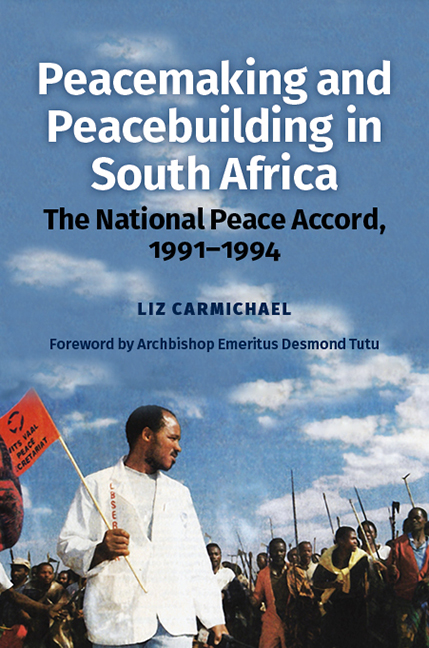Book contents
- Frontmatter
- Dedication
- Contents
- List of Illustrations
- List of Abbreviations
- Glossary
- Acknowledgements
- Note on Nomenclature
- Transition Timeline
- Foreword
- Introduction
- Part One Peacemaking, Peacebuilding, and the South African Conflict
- Part Two Peacemaking
- Part Three Peacebuilding
- Conclusion: Impact and Unfinished Business
- Bibliography
- Index
4 - Churches, Business, and Secret Conversations
Published online by Cambridge University Press: 08 October 2022
- Frontmatter
- Dedication
- Contents
- List of Illustrations
- List of Abbreviations
- Glossary
- Acknowledgements
- Note on Nomenclature
- Transition Timeline
- Foreword
- Introduction
- Part One Peacemaking, Peacebuilding, and the South African Conflict
- Part Two Peacemaking
- Part Three Peacebuilding
- Conclusion: Impact and Unfinished Business
- Bibliography
- Index
Summary
Introduction
South Africa's politicians wanted to manage their own transition, and to a large extent they did so, but others provided vital help. Alongside the increasing violence of the late 1980s came a flowering of ‘track-two’ peacemaking initiatives opening up communication between the conflicting parties, at home and in exile. Churches and business were frequently at the forefront, and between 1988 and 1990 both these pillars of civil society readied themselves to play a pro-active role in the political transition. At the same time Mandela and his captors reached out to each other and began to converse.
Churches and politics
The churches constituted by far the majority of South Africa's religious bodies. In the 1980 census 77% of the population identified as Christian, 1.8% Hindu, 1.1% Muslim and 0.4% Jewish. The churches fell broadly into five groups. The largest, 25.9% of the population, were ‘African-initiated’ independent churches, offshoots from mainstream churches, often small but including the politically conservative Zion Christian Church (ZCC) with over two million members.
The Dutch Reformed group, independent of Holland since 1824, accounted for 16.3%. It embraced the white DRC, its white offshoots the Nederduitsche Hervormde Kerk (NHK) and somewhat more liberal Gereformeerde Kerk (GK, nicknamed ‘Doppers’); and its black branches. Its Sendingkerk (Mission Church) contained just Coloured members, the black Africans having been transferred into the ‘Dutch Reformed Church in Africa’ (1952) and Indians into the ‘Reformed Church in Africa’ (1968).
When the DRC began missionary activity in the nineteenth century it assumed that all the baptized are one in Christ, and accepted all as members; but lay elders objected and in 1857 the Synod fatefully ruled that although it was desirable that black converts join existing congregations, nevertheless where this would, ‘as a result of the weakness of some’, create an obstacle to conversion, separate congregations could be formed (De Gruchy, 2004 p.8). The black congregations became the Sendingkerk in 1881.
When apartheid's theoreticians looked for theological justification, the DRC managed to supply it.
- Type
- Chapter
- Information
- Peacemaking and Peacebuilding in South AfricaThe National Peace Accord, 1991-1994, pp. 49 - 76Publisher: Boydell & BrewerPrint publication year: 2022



